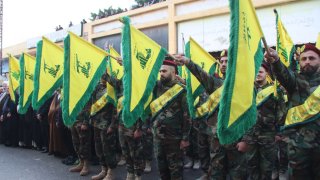Will Turkey Work With Hezbollah?
Turkey’s goal in the ongoing Lebanon crisis remains the humiliation of Israel.
Turkey is likely to play a dangerous and unpredictable role in any potential conflict between Israel and Lebanon. Conventionally, Ankara has been interested in limiting Tehran’s regional influence. Lebanon has been a premier theater where Ankara has spent diplomatic energies building ties with its government and deliberately kept Hezbollah—Iran’s flagship proxy terrorist organization in Lebanon—at arm’s length.
In the likely event of a direct military conflict between Israel and Lebanon, Ankara is likely to use this as an opportunity to undermine Israel. This will not be altogether surprising, as Turkey’s Recep Tayyip Erdogan has spared no effort in taking a firmly anti-Israeli position since the October 7 terror attacks.
Turkey’s policy towards the widening conflict is beginning to take shape. On June 25, only days after Hezbollah’s Hasan Nasrallah’s televised threats against Cyprus, Turkish foreign minister Hakan Fidan followed up with a strongly worded warning to Cyprus for the EU country’s ongoing support of Israel. Fidan accused Nicosia of acting as Israel’s “operation center.” Turkey “frequently [saw] intelligence reports that certain countries use the Greek-Cypriot Administration of Southern Cyprus as a base, particularly for operations in Gaza.” Fidan implored Cyprus to refrain from supporting Israel’s war on Hamas, which he maintained could come to Cyprus’ doorstep. The timing of Ankara’s “warning” to Cyprus did not fall on deaf ears, particularly as it came close to Hezbollah’s threats to target the European Union member state militarily.
Fidan’s words are not revelatory about Ankara’s concrete position towards Hezbollah, but Turkey’s past actions may shed important clues. In January 2024, the U.S. Treasury sanctioned several Turkish entities for providing “critical financial support” to a financial network utilized by Iran’s Quds Force (IRGC-QF) and Hezbollah in Lebanon. U.S. officials identified a series of commodity sales as providing “a key source of funding for the IRGC-QF and Hezbollah’s continued terrorist activities and support to other terrorist organizations throughout the region.” This is not an isolated incident where Turkish entities and persons have been implicated in providing material support to Iran’s IRGC and its Lebanese proxy, Hezbollah. In December 2022, the Treasury Department sanctioned Sitki Ayan, a Turkish national with close ties to Erdogan, for concealing and facilitating the sale of Iranian oil to buyers in China, the UAE, and Europe, and the sales proceeds benefiting the IRGC-QF.
These known instances of Turkey circumventing U.S. sanctions on Iran underscore that a member of NATO engages in commercial ties with designated terrorist entities across the Middle East. To be clear, Ankara is not interested in Hezbollah’s, and by extension, Iran’s wider regional interests. It is, however, interested in undermining Israel and will likely agree to work with any group or power that will achieve this goal. Since the October 7 attacks, Erdogan has publicized his telephone calls and personal meetings with Iran’s former President Ebrahim Raisi, unequivocally stating that “the Islamic world should be united against Israel’s attacks in Palestine.”
One possible idea that Turkey may float in the coming days would be a contribution of Turkish troops to the United Nations Interim Force in Lebanon (UNIFIL) and position them along the Israeli-Lebanese border as a buffer. This would serve to deter Israel from firing at Turkish troops, while Turkey would protect Lebanon and Hezbollah from being destroyed by Israeli forces. It would also help prevent a war, something that Turkey would want to exact a price for. Some analysts think that Ankara would ask for concessions in Syria from Iran, which would see the return of millions of Syrian refugees from Turkey back to their homeland—a key policy goal for Erdogan. Such a deal would also shore up Turkey’s relationship with Iran and likely be appreciated by Hezbollah, positioning Turkey as a key regional arbiter. The question remains: Does Turkey have the diplomatic gravitas in Lebanon to broker such an arrangement, and to what extent are Iran and Hezbollah interested in avoiding war?
Washington is already wary of a wider conflict in the region. General Charles Q. Brown, the Chairman of the Joint Chiefs of Staff, has even informed Jerusalem that the United States is unwilling to provide Israel with military assistance in the case of war with Lebanon. On the other hand, placing hopes in Turkey to maintain regional peace and security may turn out to be a pipe dream. In the final analysis, it must be remembered that Ankara’s goal is not to prevent a war or achieve a ceasefire in Gaza. It is interested in facilitating Israel’s defeat and humiliation on the world stage. Since October 7, it has given very clear signs to this effect.
Sinan Ciddi is a nonresident senior fellow at the Foundation for Defense of Democracies. Follow Sinan on X: @SinanCiddi.
Image: Mohammad Kassir / Shutterstock.com.

